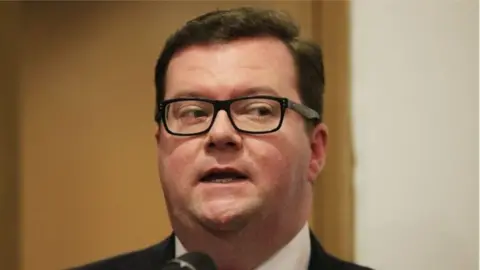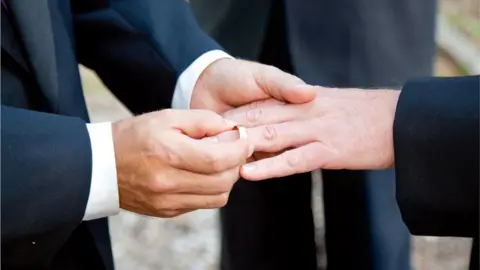NI same-sex marriage bill to be introduced in Commons
 BBC
BBCA Labour MP, born in County Armagh, is to introduce a bill at Westminster later calling for same-sex marriage to be made legal in Northern Ireland.
Conor McGinn is currently the MP for St Helen's North in Merseyside.
Northern Ireland is the only part of the UK and Ireland where same-sex marriage is still illegal.
On Tuesday, a similar private members' bill was laid before the House of Lords by the Conservative peer, Lord Hayward, and passed its first stage.
'Matters of conscience'
The issue of same-sex marriage has proved highly divisive in Northern Ireland and is currently one of the main sticking points in Stormont's continuing political crisis.
 Getty Images
Getty ImagesA decision on whether or not to legalise it would normally be decided by the Northern Ireland Assembly, but it has not been functioning for more than a year.
In a written answer to Mr McGinn in February, Northern Ireland Secretary Karen Bradley acknowledged that if the issue were to be raised at Westminster, the government's policy was to allow a free vote on matters of conscience.
The St Helens North MP has now proposed legislation in a ten minute rule bill - a form of private members' bill.
However, there is no guarantee the bill will get to the next stage.
Traditionally, ten minute rule bills rarely become law but are viewed by parliament as "a good opportunity to raise the profile of an issue and to see whether it has support among other members".
Same-sex marriage campaigners are also expected to hand in a petition to 10 Downing Street calling for the government's support in passing legislation to bring Northern Ireland into line with the rest of the UK.

Timeline of same-sex marriage laws
- England and Wales legalised same-sex marriage in July 2013 and it came into force in March 2014
- Scotland legislated for same-sex marriage in February 2014, which came into effect in December that year
- The Republic of Ireland legalised same-sex marriage in a referendum in May 2015 - becoming the only country in the world to do so by popular vote. Ireland's first same-sex marriage took place in November 2015.

Members of the Northern Ireland Assembly (MLAs) have voted five times on whether or not to end the ban.
During the most recent vote in November 2015, MLAs voted in favour of same-sex marriage for the first time, with a narrow majority of 53 votes to 52.
However, it was blocked by the DUP using a measure known as a petition of concern.
Since the last assembly vote, the Conservative Party has struck a parliamentary deal with the DUP which keeps the government in power at Westminster.
After reading his bill in the House of Lords on Tuesday, Lord Hayward told the BBC that "equality is not something you can pick and choose on around the United Kingdom".
"It should apply to all parts of the UK."
The Conservative peer's bill called for:
- Same-sex marriage to be legalised
- Same-sex marriages solemnised outside Northern Ireland to be recognised
- Provisions in the law for the conversion of civil partnerships to marriages
- A review of civil partnerships to make provisions for rights to pensions and social security contributions for same-sex married couples and civil partners
- To make provision for gender change by married couples and civil partners.
